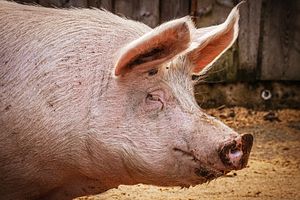Taiwan’s main opposition party is pushing ahead with efforts to initiate a referendum that could reverse the government’s decision to lift a pork import ban, which had been seen as the main obstacle to a free trade agreement with the United States.
Taiwan began allowing pork imports containing ractopamine, a controversial feed additive banned in much of the world but used in the U.S., on January 1, months after President Tsai Ing-wen announced her government’s intention to remove an existing import ban.
The opposition Kuomintang (KMT) said Tuesday it had begun collecting signatures for the second stage of a public referendum that aims to reverse Tsai’s decision.
The KMT passed the first stage of the referendum process, but that’s not a difficult threshold to meet: The party was required to collect the signatures of 0.01 percent of eligible voters in Taiwan’s last presidential election, or 1,931 people. It reached that goal last month.
It must now collect the signatures of 1.5 percent of eligible voters – around 290,000 people – for a referendum to take place.
If successful, the public will vote on a referendum question, which, according to the KMT, would ask: “Do you agree to a total ban on the importation of pork and related products containing leanness-enhancing additives (ractopamine and other beta-agonists)?”
Under Taiwan’s referendum laws, at least 25 percent of all eligible voters – around 5 million people – must vote in favor for the measure to pass. The number of yes votes must also outnumber the number of no votes.
Tsai said in August her government would allow imports of pork and beef containing safe levels of ractopamine starting on January 1, removing what had been the primary hurdle to negotiations on a free trade pact between Taipei and Washington. The move was a domestic political risk and faced immediate backlash from the KMT, along with pig farmers.
Health experts have been split on the issue in Taiwan and throughout the world. Ractopamine can allow an animal to grow larger and leaner with less food, especially in its last few weeks before slaughter. But many countries group it with other beta-agonist drugs, which have been shown to be harmful to human health.
The ruling Democratic Progressive Party (DPP) set standards allowing pork with traces of ractopamine it says are not harmful to human health.
KMT chairman Johnny Chiang has insisted his party’s opposition to the decision is an issue of public health, rather than politics.
But there are questions over whether Taiwan’s public referendum system allows voters to make informed decisions on complex issues that can be difficult to understand.
In 2018, Taiwan voted on a slate of 10 referendums, deciding to uphold restrictions on same-sex marriage and food imports from Japan’s Fukushima region while opposing plans by the DPP to decommission the nation’s three active nuclear power plants by 2025. (The legislature legalized same-sex unions months later by sidestepping the restrictions in that referendum decision.)
Experts criticized Taiwan’s 2018 referendums, saying they did not give the public enough time and information to make informed decisions. Referendums only required a one-month public deliberation period – far shorter than the time period required in other countries with referendum laws, such as Ireland.
The KMT may call pork imports a public health issue, but the public will see it through a political lens. Should the referendum drive be successful, Taiwan’s people will be asked to decide on an issue that even health experts have not agreed upon – and their decision could dictate the future of trade between Taiwan and the United States.

































